Have you ever stopped communicating with an individual on social media for no clear reason? Or maybe you were on the opposite end and were ignored without clarification? If so, you have likely encountered ghosting.
Today, these occurences are becoming exponentially widespread, speciffically among the younger generation. The more we build relationships (whether friendly or romantic) over the digital realm, it becomes tempting it is to disappear without a trace. In this article, our team has covered:
- What is ghosting?
- Why is it harmful to everyone involved?
- How can you deal with being ghosted?
👻 What Is Ghosting?
Ghosting is an online phenomenon which refers to ‘vanishing’ from someone’s life without an explanation. An individual stops replying to your messages, returning calls, or communicating on social media. The practice typically applies to romantic relationships, but one can also ghost a friend or acquaintance.
Though informal, the term ‘ghosting‘ was added to the Merriam-Webster dictionary in 2017.
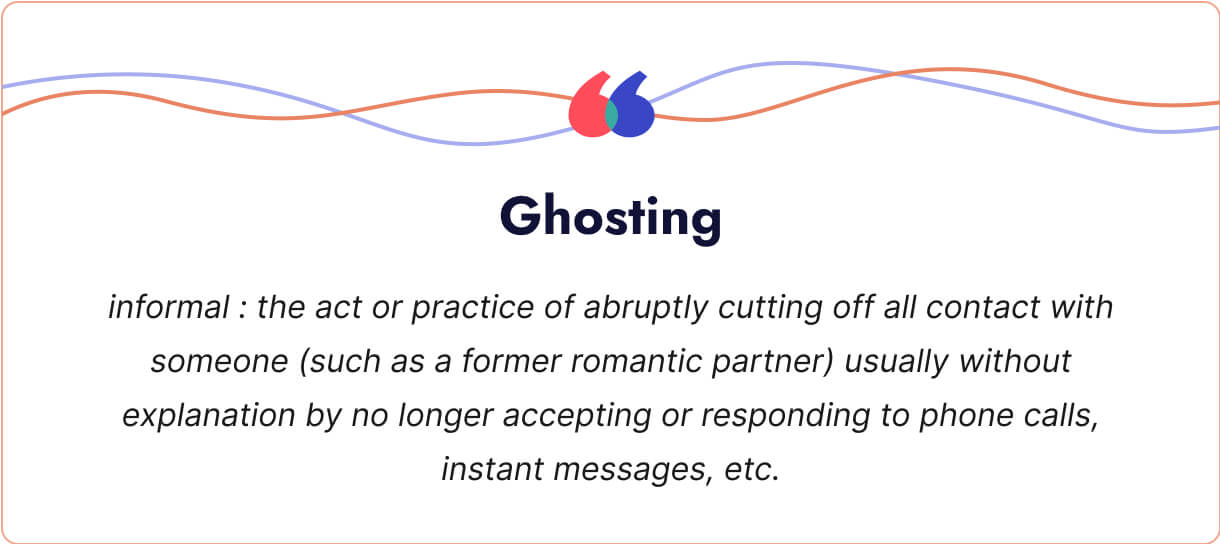
It became well-known recently due to the popularization pervasiveness of Internet dating. As individuals meet on social media or networking apps, they can abandon the conversation without saying goodbye. Disappearing from someone’s DMs is as simple as doing absolutely nothing or clicking the ‘Block’ button.
Ghosting is a coping mechanism that affects both the ghoster and the ghostee.
Psychological Effects of Being Ghosted
Losing a lover or friend is never simple, especially when it happens without your participation. Upon being ghosted, you may feel disoriented, betrayed, and hurt – these emotions are organic.
Other psychological outcomes include:
- Abandonment issues
Ghosting can activate your old traumas. If your parents neglected you or were emotionally cold, being ghosted by a person can prompt painful memories. You might try to reach this person or keep thinking about them. Either way, it’s essential to keep in mind that you are not at blame. - Grief and anxiety
When a close person vanishes completely, it might feel as though they died. Thus, ghosting can cause you to feel shock and grief. These emotions of sadness are natural when you experience the loss of any relationship. - Fear of relationships
You may get so fond of the ghoster that building any other connection again feels unimaginable. This way, ghosting can impact your future ability to be in a relationship. It is key to take time and address these underlying troubles so you can heal. - Low self-esteem
The experience of ghosting can set off your inner critic, reaffirming negative self-perceptions. Consequently, you can have low self-esteem.
Consequences of Ghosting Someone
Despite what you may believe, the ghoster does not go unaffected. Since ghosting tends to be an unhealthy coping mechanism, individuals are likely to encounter some consequences from abandoning another person. Researchers tried to explore their state of mind after vanishing from someone’s life via questionnaires and surveys.
They have concluded that those who ghost their lover or acquaintance can suffer from:
- Inability to build lasting connections. Ghosting a loved one can leave you emotionally stunted. It can create a pattern of unhealthy interaction with people. An inability to form meaningful connections can leave you existing in an emotional vacuum.
- Guilt and low self-confidence. Most people who ghost also experience painful feelings. For instance, they tend to feel shame, awkwardness, and anxiety after ghosting a partner.
- Declining social skills. When someone cuts communication suddenly, it can cause them to feel a lack of empathy. They struggle to comprehend the other person’s feelings and reactions.
- Fear of confrontation. The more frequently you ghost someone, the more difficult it gets to face others. Sometimes it comes from the desire to avoid hurting others. Yet, if you rely on ghosting to escape conflict, you can develop a chronic fear of intimacy.
😥 Why Do People Ghost?
Ghosting is usually an unhealthy way to cope with emotions and problems. Most people realize that blocking your partner or friend on social media or ceasing to respond to their messages won’t solve anything. So, why do people continue practicing it?
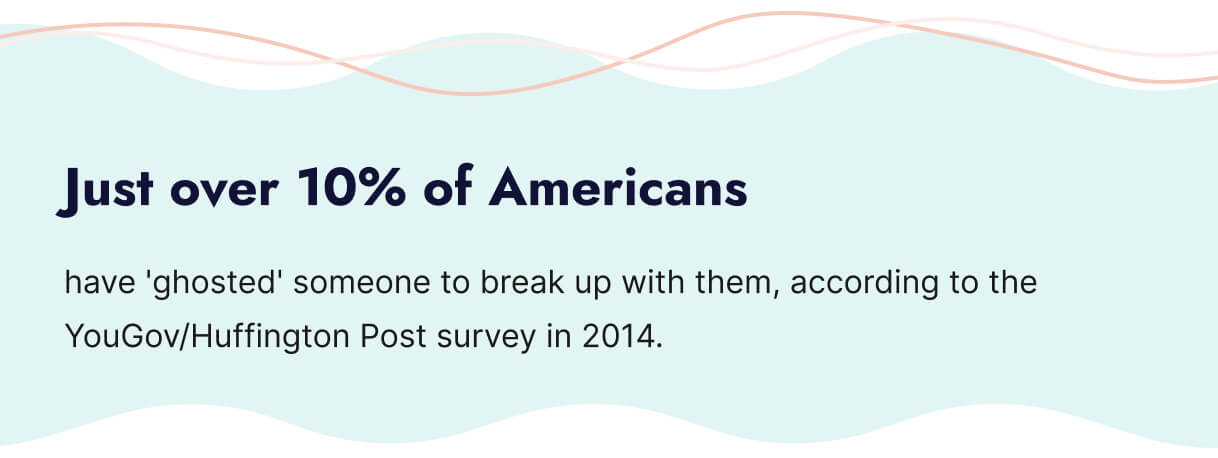
Some mental health conditions cause reduced empathy and an inability to engage in relationship communication etiquette. These include:
- alexithymia in which logic overrides emotions,
- antisocial personality disorder,
- borderline personality disorder,
- and narcissistic personality disorder.
People with the latter are often regarded as self-centered and lacking empathy. However, most of the time, they do not understand what they are doing is wrong.
There are also other reasons why people ghost:
- It’s an easy way out. It is easier than ever to communicate and even date someone with the help of technology. It is even easier to dissolve relationships. However, remember that this is a cowardly way out.
- They can be emotionally unavailable. In some cases, ghosting can be tied to a mental health issue. Sometimes when a person demonstrates a lack of empathy. It may also be an indication of depression or other diseases.
- Technology allows it. Ghosting is much worse now because of technology. Apps like Tinder and Bumble ‘gamify’ the search for love and may appeal to ghosters. Digital access to people can make us forget that we communicate with human beings. The person on the other side of the screen has real emotions at the other end.
- A ghoster may suffer from information overload. It can happen when the amount of input exceeds processing capacity. People may feel confused, stressed out, and start making mistakes. You can feel anxious about the amount of technology in your life. Thus, you may choose to delete apps that can result in on-purpose or accidental ghosting.
- They might have an avoidant attachment style. Children develop it when their caregivers don’t meet their emotional needs. Having grown up with avoidant attachment styles, people tend to experience difficulty accepting criticism, inability to build connections, and fear that relationships can cause them harm. As a result, when a person gets too close, they want to run away and ghost their partner.
- Their personality disorders may cause ghosting. Some mental health conditions cause lowered empathy. They also meddle with the ability to choose a proper way to contact and end the relationships.
- A ghoster may lack emotional intelligence. It is the ability to understand your feelings and relate to those of others. Not everything possesses emotional intelligence or knows how to maintain long-term relationships. So, they may not recognize all the signals people send through body language, expressions, or even words.
Of course, none of these reasons justify the ghoster. However, you should understand that sometimes, people stop responding to our messages due to their problems, not yours. It is not your fault.
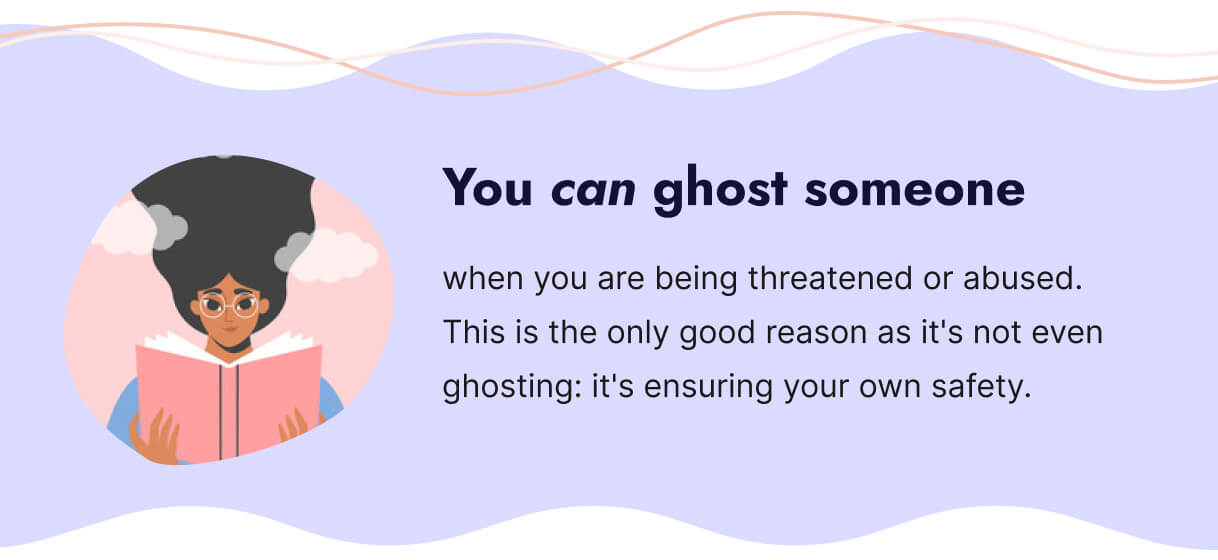
📵 How to Cope with Being Ghosted: 11 Tips
Even understanding all the reasons behind ghosting, you will still feel hurt when it happens to you. It’s only natural to get worried and upset over the sudden loss of a friend or partner. That’s why learning how to cope with these emotions is crucial.
If you don’t have half an hour to watch this helpful video, feel free to check the sections below. We’ve provided all the essential tips on coping with being ghosted. And if you want to write an essay on such issues or other mental health problems, check these psychology topics.
1. Text Your Ghoster Once
It may feel counterintuitive, but sometimes, it will be beneficial to check whether you are actually being ghosted or not. A person may have external causes not to reply: falling sick, being too busy, or getting in an accident. So, at first, try to contact the possible ghoster once more.
Here are some examples of what to message:
When They Are Phasing You out
Are you feeling as though your interlocutor has become colder toward you? Do you receive replies to your messages after several days or even weeks, despite the person being regularly online? Ask them whether everything is alright and why they are being distant.
For example:
“Hi, [name]! Haven’t heard from you in a bit. Hope that everything is alright. Please let me know if something happened – or if you simply lost interest in our chats. No hard feelings, but I’d rather know!”
“Hey there! Sorry if I’m being presumptuous but based on our latest exchanges, I’m getting the sense that you don’t really want to converse with me anymore. Wanted to let you know that it’s fine if that’s so – just please be upfront about it!”
“How are you, [name]? I wanted to check in to see if things are alright between us. If I said something to upset you or if you simply don’t have the energy for me anymore, please tell me.”
When They Have Ghosted You
You could be feeling lost if a person keeps ignoring you, doesn’t return calls and texts, or has even blacklisted you. To get some closure, it might be a solid idea to send them a straightforward goodbye message.
For example:
“You haven’t answered me in a really long time, so I am going to assume you no longer want to keep up communication. I wish you all the best, even though I do regret you didn’t tell me how you felt instead of leaving me hanging.”
“Hey! I’m not going to keep sending messages anymore since you don’t seem to be answering. However, I did want you to hear that you didn’t need to ghost me. You could’ve told me how you felt, and I would’ve respected your wishes to stop interacting.”
If you don’t get an answer to these messages, make peace with it. It is likely that you won’t get any closure. That means that trying to keep texting the person is of no use.
2. Accept Your Emotions
Yes, being ghosted is unfair. Yes, it hurts. And yes, you will be angry, irritated, numb, or upset over it, despite telling yourself it doesn’t matter. All of these reactions are inherent responses to being ghosted. The sooner you accept your pain, the easier it will be to let go of it.
- Let yourself grieve.
You might think it’s empowering to pretend like you don’t care about what happened. Yet, losing a relationship is always painful. Allow yourself to process your sadness and feel the full range of emotions surrounding the situation. - Have a cry.
Taking a step further from the advice above, don’t be ashamed to express your feelings externally. You are likely to recover much quicker after you have had a good long cry. - Be gentle with yourself.
Naturally, beating yourself up when you’re already feeling down is the worst thing you can do. Don’t go down the spiral of self-blame and criticism. Understand that your feelings are normal and valid. - Discuss it with a friend.
You can also try chatting with a close person, find help on online forums, or even seek a therapist. Getting an outsider’s opinion on the situation will help you stay more grounded. Also, it will allow you to move on faster. - Express yourself.
Once again, don’t dismiss your feelings or try to bottle them up. Set your emotions loose: create art, exercise, listen to sad songs, dance like there is no tomorrow, or even scream into a pillow. You will definitely feel better after putting your feelings out into the world.
3. Avoid Wondering Why You Were Ghosted
Due to the very nature of ghosting, you are unlikely to ever find out why that particular person stopped responding. Therefore, don’t burden yourself with this question for too long.
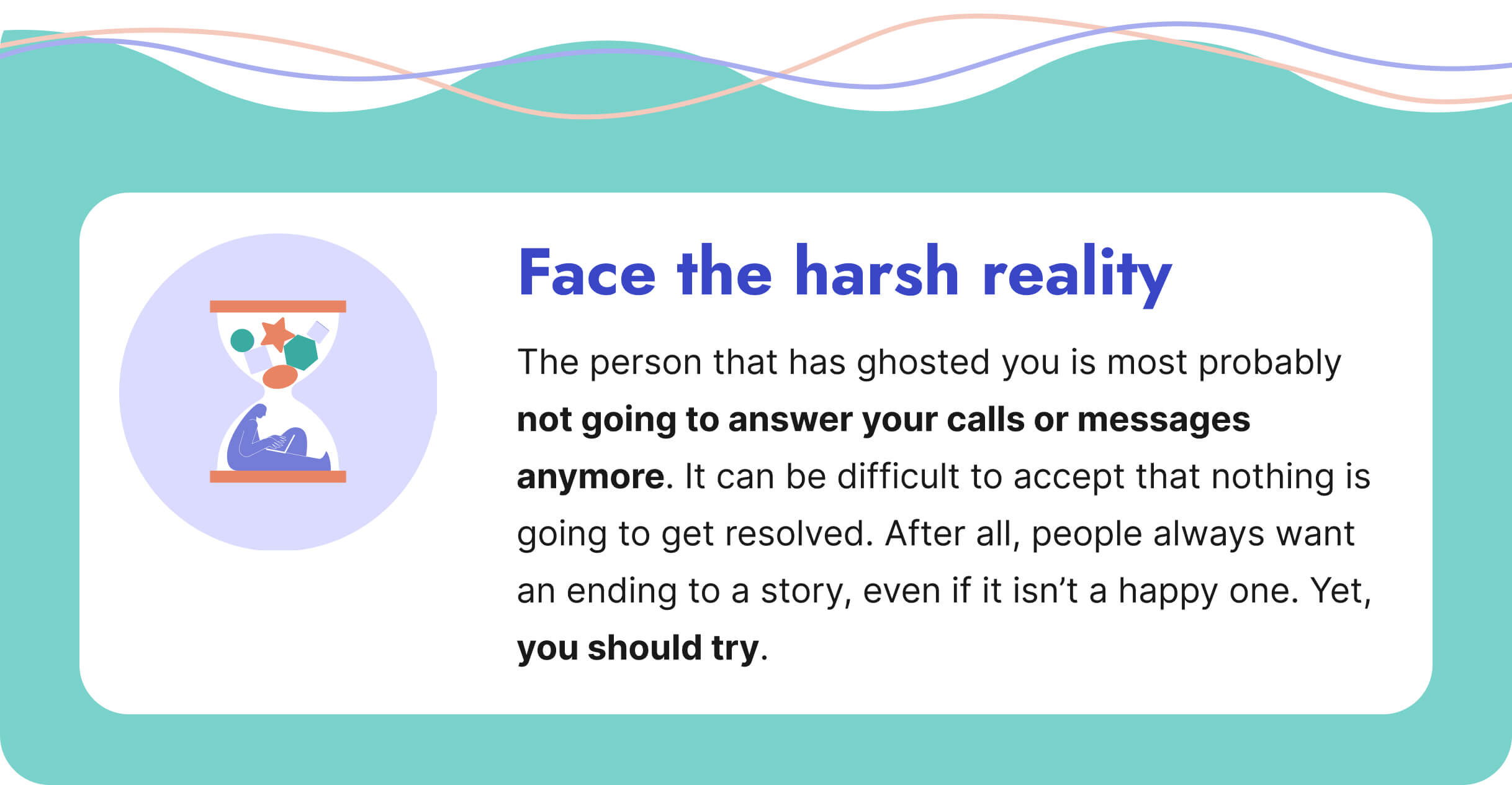
Acceptance is the first step on the road to recovery. Instead of spending your time self-doubting, questioning, or checking your messenger for a response, focus on other facets of your life. At this point, any further attempts at communication will only keep hurting you. Therefore, avoid getting stuck in an endless loop of uncertainty and move on.
4. Pity Your Ghoster
Of course, this particular advice is not for everyone. However, it might help you out if you are the kind of person that can feel compassion or even pity for your ghoster. This way, you will increase your self-worth. It will let you feel above the entire unpleasant situation.
- Understand how insecure and anxious the ghoster must be to disappear from your life without a trace. A self-confident person would have confronted the situation head-on.
- Feel sympathy for this individual, as they likely adhere to the avoidant attachment style. Building other relationships in their life will be quite challenging for them.
- Show compassion for the psychological issues of someone that would resort to ghosting other people. This is the type of person that needs lots of self-work and self-evaluation to deal with their problems.
- Remember that the ghoster will likely find it incredibly difficult to maintain long-lasting relationships with others. By ghosting you, they showed that they cannot set their boundaries and express their emotions comfortably. They will probably struggle to build genuine connections.
- Finally, realize that this person lost a lot when they seized communication with you. It is clear that you were willing to put a lot of work and effort into your relationship with them. By cutting contact, they have lost a good friend or partner.
Or simply exhale with relief – after all, this unhappy person will no longer be a part of your life.
5. Don’t Blame or Shame Yourself
We will repeat it again and again if we have to: you are not the one to blame when you have been ghosted. Unless you have somehow hurt, betrayed, or threatened the other person, you are not at fault. Naturally, we suspect that you would not be reading this article if that was the case. Therefore, no, you should not blame yourself.
Replace your guilt or shame with these emotions:
Guilt -> Self-compassion
After someone walks out on you without so much as a word, it is hard not to feel like you are somehow responsible for this. Yet, as we have discussed above, these instances are more than likely a representation of the ghoster’s psychological issues.
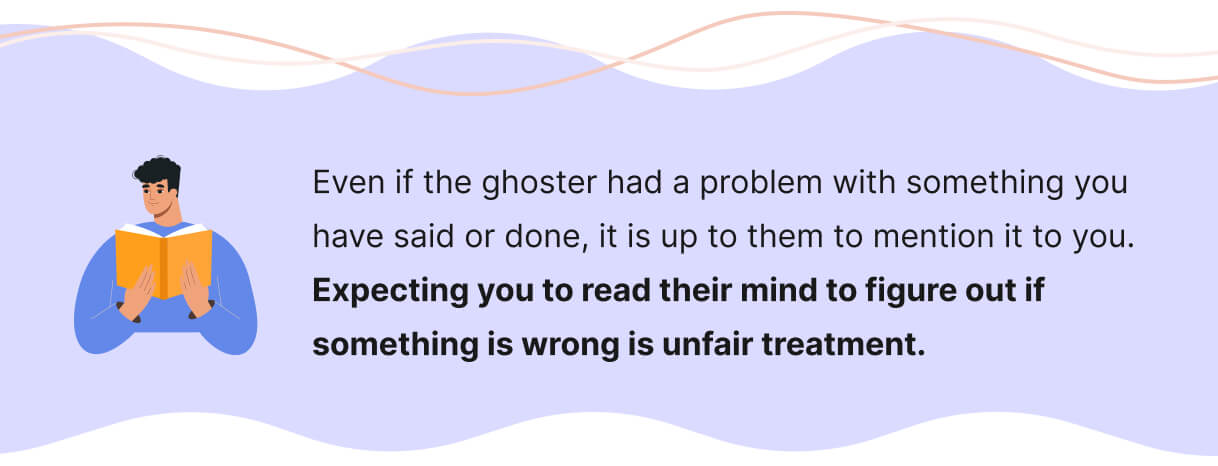
Therefore, replace your inner critic with a compassionate, kinder approach. Think about what kind of advice you would give to a good friend going through a similar situation and adhere to it yourself. In these difficult times, the most important thing to remember is that you should be kind, gentle, and patient with yourself.
Shame -> Positivity
Not only is ghosting wildly unpleasant – it is also embarrassing and awkward. When someone stops speaking to you seemingly out of nowhere, it can trigger a lot of insecurity and doubt. We’ve all faced rejection in our lives, and this is just another reminder of all those times we have felt unwanted.
If being ghosted stirs up unpleasant memories, it means that you still haven’t moved past them. Perhaps it is a sign to self-reflect and take the time to process and recover from earlier rejections and betrayals.
Think about what those experiences have taught you and how different you are now from who you were. Take time to learn from your experiences. This way, you will find it easier to build healthier relationships later on.
Condemnation -> Gratitude
It might be enticing to start focusing on your flaws, the things you said or did wrong, or how it could have been different. Do not try to pick yourself apart because of someone else’s decisions.
Rather, emphasize all the little positive things that you enjoy in your life. It can be something as mundane as a new book, your favorite sweater, a video game you play often, or the way your outfit looks. Practice being grateful for these things – and for yourself!
After all, you are the person who has managed to get you through every single bad day you’ve ever had. Realize that you will always be there to support yourself. Become your best friend.
6. Focus on Your Well-Being
Indulging in bad habits, like drinking alcohol, binge eating, or smoking won’t help you recover. Instead, try to get better by improving your lifestyle and minding your health. Here is what else you can do:
- Prioritize rest. You might struggle with insomnia due to overthinking or grieving. Taking care of your sleeping schedule is essential when recovering from ghosting. Sometimes, simple steps can help you normalize your patterns. For example, keep your phone turned off in the evening, meditate before sleep, and don’t stay up late.
- Practice mindfulness or meditation. Being ghosted can reinforce pain, anxiety, and other feelings you don’t welcome. Mind-body practices like yoga can reduce physical strain from being ghosted. Meditation is another way to calm your thoughts and ground yourself.
- Fix your diet. Overeating or skipping meals won’t heal your wounds. So, make sure you eat well after being ghosted. Your diet will not take away the pain, but some foods can help you feel better.
- Go outside and breathe the fresh air. Spending time outdoors can make you feel better after being ghosted. Walking out can improve brain function and sleep. It also boosts the immune system and motivates you to focus on the positives.
- Try exercising. It can help you get back on track sooner than if you spend your days on a couch. Consider jogging twice a week or going to a gym. Physical activity releases chemicals like endorphins and serotonin that improve your mood. Besides, it will make you confident in yourself.
- Reflect on your self-worth. Recognize that you should be treated better. You deserve to be loved and respected. Thus, instead of focusing on the person that ghosted you, concentrate on yourself. You deserve someone who will treat you right!
7. Do Something You Enjoy
Another way to bounce back is to do something you love. It can be a small ritual, a self-care routine, or something you have always wanted to try. Thankfully, there is an abundance of things that you can enjoy.
For example:
- Bring back an old hobby you’ve abandoned.
Ghosting can be an invite to search inward for what you love. Recall your true passions and interests you once had. There is life after ghosting, and it can be wonderful too. - Improve your self-care routine.
A good self-care routine is more of an attitude towards life. So, you don’t need to spend much money on that. Eat well, exercise, and develop healthy sleeping patterns. Also, pick up new facial masks, bath bombs, and hand lotions – that won’t hurt either. - Try out an activity you’ve always wanted to.
Experimenting with new things can improve your mood when feeling down. It can be something you have always wanted to do. Or it might be some completely unpredictable practice! Either way, it will keep you distracted from the thoughts about the ghoster. - Spend time with your close ones.
After being ghosted, rely on friendship and family bonds. These connections can give you support and confirmation that you are amazing. People you love and respect will help you find your self-worth.
8. Meet New People
You might want to bury yourself in the shell and avoid people in general. Yet, in this case, you will only extend the influence of the ghoster on your life. The faster you forget about this situation and open up to new people, the quicker you will overcome the pain.
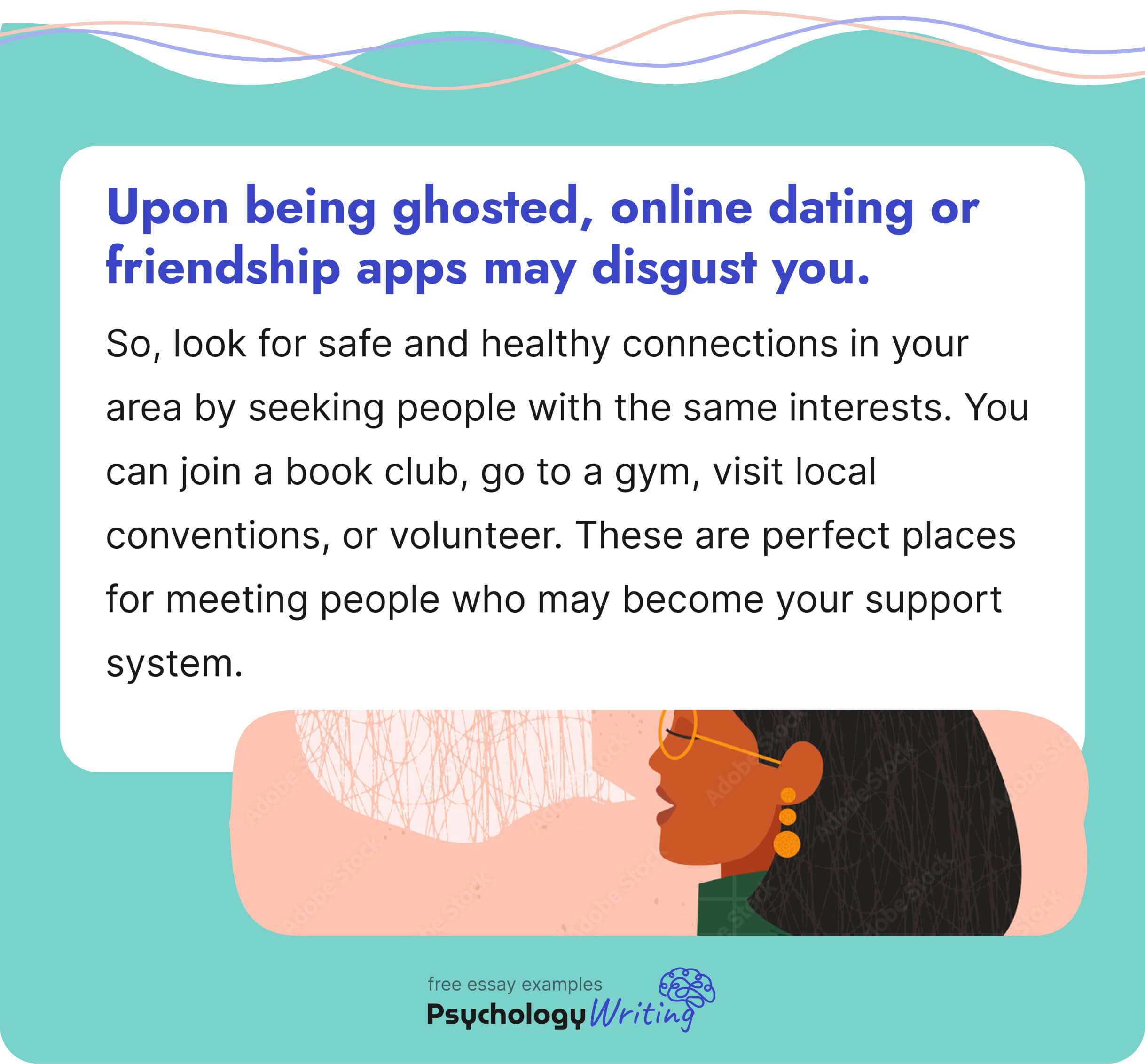
Not ready to welcome new individuals into your life? Wait a bit; it will be easier as time goes by.
In the meantime, call an old friend or a family member. Strengthening the ties you already have is another way to nurture healthy relationships. Just remember that there are people that love you and want to be in your life.
9. Write Your Thoughts Down
We’ve already recommended you express your emotions in some way or another. Yet, writing down everything you feel and think is the most beneficial option.
Psychologists have found that expressively writing down your thoughts and feelings will help with both physical and mental health. It will allow you to manage your stress, anxiety, depression, and PTSD. It also gives a space for positive self-talk, enabling you to prioritize your emotions. Additionally, you can use the journal to plan your recovery steps after being hurt.
To start journaling, just sit down, take a sheet of paper, and write down everything that worries or upsets you. Yes, it’s that simple.
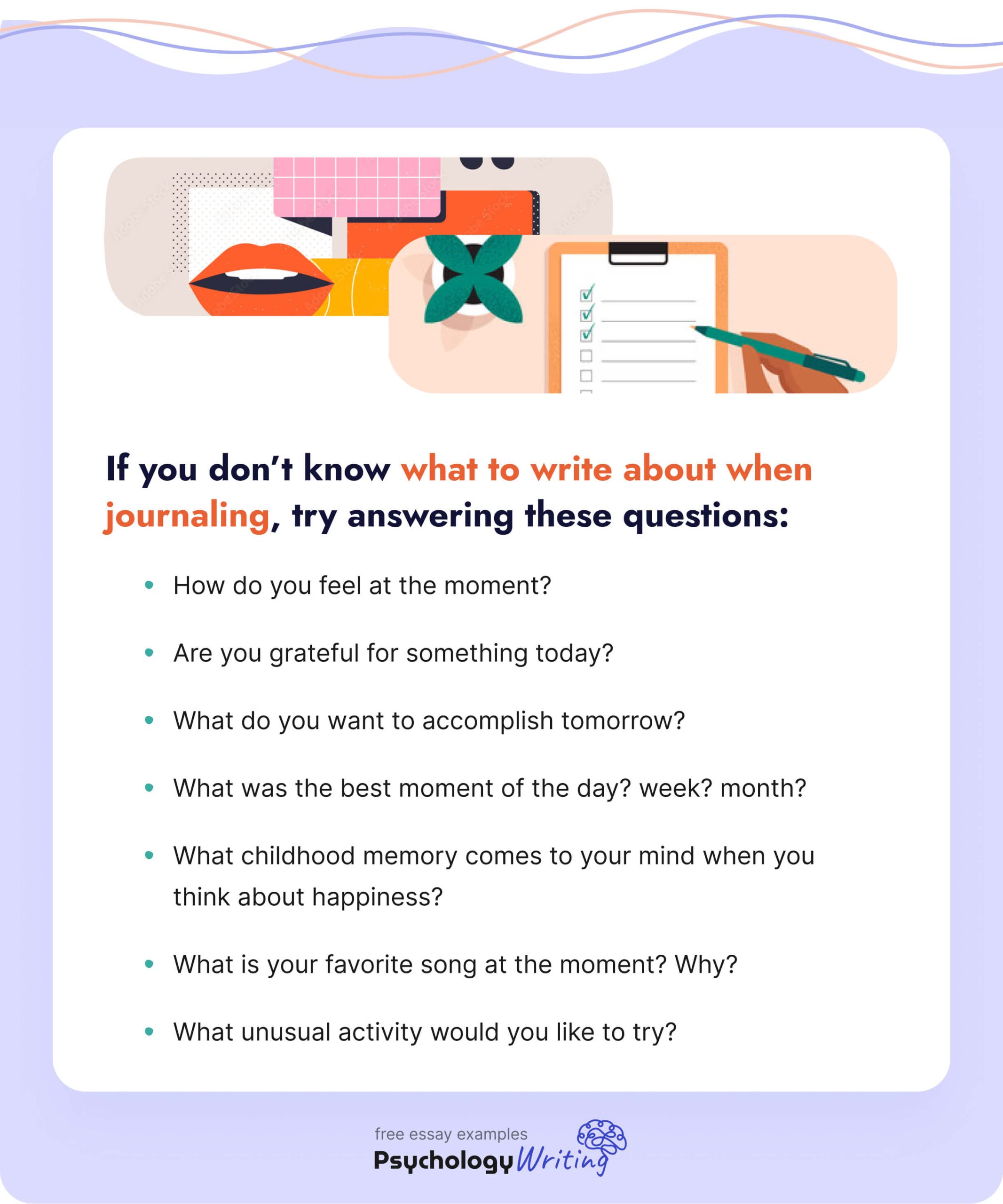
If you struggle to start, set a timer for 20 minutes. Persuade yourself that you can write anything, even the silliest things, during this period, and then stop altogether. Twenty minutes will go by unnoticed! And if you’re persistent, your daily scribbles may turn into your autobiography.
10. Let It Go
There is a reason why Elsa’s song from “Frozen” is so popular. Apart from a catchy melody and unique vocals, it introduces a valid meaning: you can’t move on until you let it go. And it is true, whether we’re talking about accepting yourself, leaving the castle, or forgetting about your ghoster.
- Let yourself heal. Don’t rush into new relationships if you are not ready to trust others.
- Understand what you want. It’s difficult, but try to consider what you want in the future partnership.
- Don’t focus on the pain. You should accept that it hurts and acknowledge your feelings, but avoid wallowing in your sadness.
- Seek positive emotions. Allowing yourself to be happy and experience positivity is essential to getting over the ghoster.
Keep in mind:
In a few months or years, you won’t even remember your ghoster’s name or why they were so important to you.
🎶 You’re never going back, the past is in the past!
11. See a Therapist
Unfortunately, reflecting and accepting your emotions may not be enough. Sometimes ghosting can be too difficult to overcome. It can prevent you from meeting other people, destroy your self-esteem, and contribute to your abandonment issues. If that’s the case, we recommend going to a therapist.
- When suffering from trauma-based issues, consider body-focused therapy or EMDR.
- To fight against harmful patterns, find a therapist certified in a cognitive analytic approach or schema therapy.
- If your problem is low self-esteem, the specialist can try treatments such as cognitive behavioral therapy.
With professional help, you can learn how to overcome any issues linked to ghosting. There are numerous resources to find a mental health specialist. For instance, check over FindTreatment.gov and Lumo Health.
If you don’t have a healthcare package or looking for short-term mental health professional aid, seek online therapy services. You can also contact a sliding scale therapist or local support groups.
☝️ Conclusion
Coping with being ghosted isn’t effortless. You will have to acknowledge the hurt, push yourself to feel better, and move on. However, we are sure that you can handle it and build healthy connections in the future.
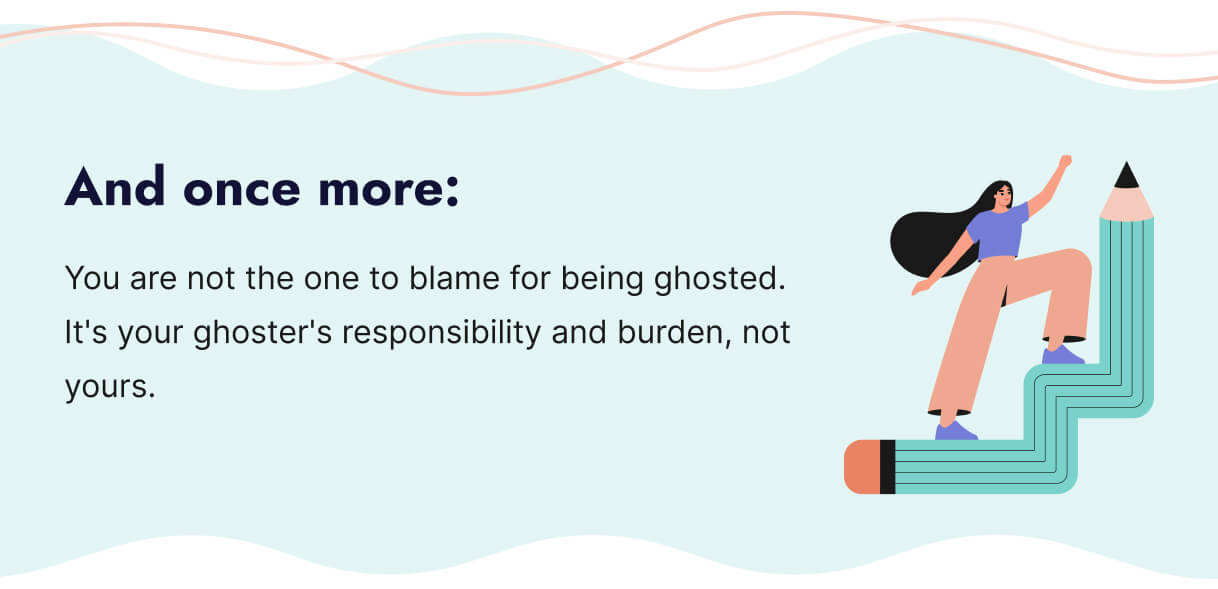
Thank you for reading the article! If you think your friend or close friend may need our advice, send them the link to this page.
📍 References
- When Your Boo Becomes a Ghost: The Association Between Breakup Strategy and Breakup Role in Experiences of Relationship Dissolution | Rebecca B. Koessler et al., the University of California Press
- Psychological Correlates of Ghosting and Breadcrumbing Experiences: A Preliminary Study among Adults | Raúl Navarro et al., PMC, National Library of Medicine
- Disappearing in the Age of Hypervisibility: Definition, Context, and Perceived Psychological Consequences of Social Media Ghosting | Thomas, J. O., & Dubar, R. T., PsycNET
- 7 Essential Psychological Truths About Ghosting | Loren Soeiro, Psychology Today
- How ‘Ghosting’ Is Linked to Mental Health | Royette T. Dubar, The Washington Post
- Ghosting in Emerging Adults’ Romantic Relationships: The Digital Dissolution Disappearance Strategy | Leah E. LeFebvre, et al., SAGE Journals
- Journaling for Mental Health | Health Encyclopedia, the University of Rochester, Medical Center

